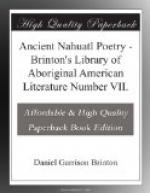coyoltototl, literally, “the rattle-bird,” so called from its peculiar notes (coyolli = a rattle), is one of the Tanegridae, probably the Piranga hepatica.
ayacachicahuactimani; composed of ayacachtli, the rattle (see ante, page 24); and icahuaca, to sing (of birds); to the theme of this verb is added the connective syllable ti, and the verb mani, which, in such connection, indicates that the action of the former verb is expended over a large surface, broadly and widely (see Olmos, Gram. de la Langue Nahuatl, p. 155, where, however, the connective ti is erroneously taken for the pronoun ti).
hueltetozcatemique; composed of huel, good or well; tetozca, from tozquitl, the singing voice; and temo, to let fall, to drop; que is the plural verbal termination.
3. ma n-amech-ellelti, vetative causative from elleloa, to cause pain.
cactimotlalique, appears to be a compound of caqui, to listen, to hear, and tlalia, to seat, to place.
amohuampotzitzinhuan, a compound based on the pronoun of the second person plural, amo, the particle po, which means similarity or likeness, and the reduplicated reverential plural termination. The same particle po, appears a few lines later in toquichpohuan; potli = comrade, compeer.
4. Tepeitic, from tepetl, mountain, ititl, belly, from which is derived the proposition itic, within, among. The term is applied to a ravine or sequestered valley.
5. quauhtliya ocelotl, the expression quauhtli, ocelotl, is of frequent occurrence in the ancient Nahuatl writers. The words mean literally “eagle, tiger.” These were military titles applied to officers commanding small bodies of troops; figuratively, the words mean control, power, and dignity; also, bravery and virtue. Comp. Agustin de Vetancurt, Teatro Mexicano, Tratado II, cap. 3.
6. in tloque in nahuaque; this expression, applied by the ancient Nahuas to the highest divinity, is attributed by some to Nezahualcoyotl (see above, p. 36). It is composed of two postpositions tloc and nahaac, and in the form given conveys the meaning “to whom are present and in whom are immanent all things having life.” See Agustin de la Rosa, Analisis de la Platica Mexicana sobre el Mislerio de la Santisima Trinidad, p. 11 (Guadalajara, 1871). The epithet was applied in heathen times to the supreme divinity Tonacateotl; see the Codex Telleriano-Remensis, in Kingsborough’s Mexico, Vol. VI, p. 107.
8. ximoayan; this word does not appear in the dictionaries of Molina or Simeon, and is a proof, as is the sentiment of the whole verse, that the present poem belongs to a period previous to the Conquest. The term means “where all go to stay,” and was the name of the principal realm of departed souls in the mythology of the ancient Nahuas. See Bartholome de Alva, Confessionario en Lengua Mexicana, fol. 13 (Mexico, 1634); Tezozomoc, Cronica Mexicana, cap. 55; D.G. Brinton; The Journey of the Soul (in Aztec and Aryan Myths), Philadelphia, 1883.




